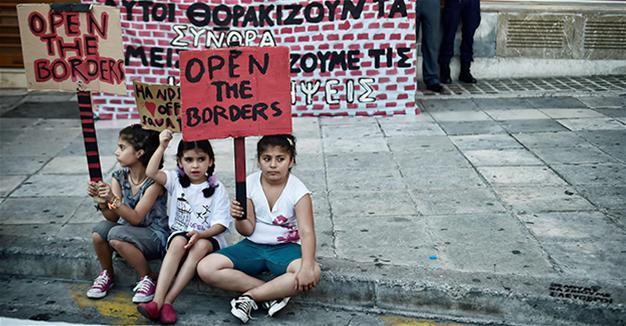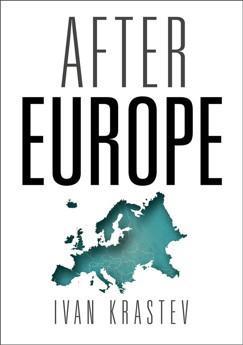‘After Europe’ by Ivan Krastev
William Armstrong - william.armstrong@hdn.com.tr

Refugee children sit in front of a mock fence with the slogan 'They secure the borders, we secure squats,' set up at the entrance of the Interior Ministry in Athens, Greece. AFP photo
‘After Europe’ by Ivan Krastev (University of Pennsylvania Press, 120 pages, $19.95)
Europe is roiled by unpredictable political waves. Economic trouble, the refugee crisis, clashes with U.S. President Donald Trump, and the threat from Russia all pose unique challenges. The political experiment in Brussels, until a few years ago characterized by staid dullness, today provides fertile subject matter for thinkers ruminating on the limits of liberalism, the rise of populism, and the end of the End of History. Publishers are responding by producing a flood of snappy, short book-length takes.

Among the latest is “After Europe” by Ivan Krastev, head of the Sofia-based Center for Liberal Studies and New York Times columnist. At little over 100 words, it is a gloomy but punchy assessment of the disintegration that Krastev believes the EU is facing. “The ambition of this book is neither to save the EU nor to mourn it,” he writes. “It is by no means the book of a Euroskeptic. It is simply a meditation on something that will now likely come to pass.”
Krastev writes that disintegration would “doom the continent to disarray and global irrelevance … likely transform[ing] a sympathetic environment of tolerance and openness to one characterized by a bullying narrow-mindedness.” With states like Poland and Hungary already showing signs of democratic decline, disintegration could further accelerate the breakdown of liberal democracies in Europe and usher in the collapse of several existing member states. “It will not necessarily lead to war, but it will probably contribute to misery and turmoil. Political, cultural, and economic cooperation won’t evaporate, but the dream of Europe free and united probably will,” Krastev writes.
Although he is gloomy, he also takes a philosophical approach to the prospect of disintegration. At times he seems to suggest that the challenges are basically unsolvable - the inescapable result of both “structural deficiencies” and “sleepwalking.” The former is largely due to the fact that the EU is essentially “an idea in search of a reality,” he writes. “There is a growing worry that what once kept the union together no longer holds. Shared memories of the Second World War, for example, have faded from view.” Today’s external threats, meanwhile, only seem to further divide Europe rather than unify it.
Krastev is fixated on the refugee challenge as a motor of the wider crisis. The influx of millions of migrants into Europe from Syria and elsewhere has exposed and exacerbated the divide between east and west Europe, which Krastev says threatens the future survival of the union itself. “The migration crisis not only shifted the Left-Right balance in European politics and undermined the liberal consensus governing Europe for decades, but also provoked an identity crisis on both the left and the right and upended the very arguments the EU has used to justify its existence,” he writes. “Tolerance and civility were long the defining characteristics of the European Union. Today they are often perceived as the EU’s core vulnerabilities.”
The book is insightful on the historical and political origins of xenophobia and illiberalism in central and eastern Europe. We must look to the region’s history to understand today’s anti-cosmopolitanism hostility to migrants in largely homogenous and increasingly illiberal states like Hungary and Poland. Viewing the issue from the Bulgarian capital Sofia, Krastev has a useful perspective to share on all this, but at times his determination to understand rather than condemn intolerance in former Eastern Bloc countries is patronizing.
He has an aphoristic turn of phrase and the book is peppered with illuminating literary references. But ultimately his pessimism may be unwarranted. Looking at the Brexit vote and the increased visibility of the far-right, he concludes that populist nativism is likely the unstoppable force of the future. This seems premature. The latest media narrative is more optimistic. Growth is picking up in the Eurozone and the mainstream center is holding in France and Germany – bolstered by the negative examples of Brexit Britain and Donald Trump’s United States – making predictions about the death of the European project look premature.
“After Europe” feels strangely 2016.
Krastev’s diagnosis may be problematic but there is little to dispute in his remedy. “Flexibility – not rigidity – is what may yet save Europe,” he writes, stressing the spirit of compromise and conciliation. Survival and resilience has some strategic value in itself: “The EU should not try to defeat its numerous enemies but try to exhaust them, along the way adopting some of their policies (including the demand for well-protected external borders) and even some of their attitudes (free trade is not necessarily a win-win game).”
Amid myriad economic, political and security challenges still facing the EU, a looser, more multi-speed union with a Eurozone core and range of alternative arrangements for peripheral states seems to be the most sensible and historically coherent path to take. The biggest difficulty is actually getting there.
* Follow the Turkey Book Talk podcast via iTunes here, Stitcher here, Podbean here, or Facebook here.

 Among the latest is “After Europe” by Ivan Krastev, head of the Sofia-based Center for Liberal Studies and New York Times columnist. At little over 100 words, it is a gloomy but punchy assessment of the disintegration that Krastev believes the EU is facing. “The ambition of this book is neither to save the EU nor to mourn it,” he writes. “It is by no means the book of a Euroskeptic. It is simply a meditation on something that will now likely come to pass.”
Among the latest is “After Europe” by Ivan Krastev, head of the Sofia-based Center for Liberal Studies and New York Times columnist. At little over 100 words, it is a gloomy but punchy assessment of the disintegration that Krastev believes the EU is facing. “The ambition of this book is neither to save the EU nor to mourn it,” he writes. “It is by no means the book of a Euroskeptic. It is simply a meditation on something that will now likely come to pass.”